
Mahasweta Devi wins Magsaysay award

|
Mahasweta Devi
|
Mahasweta Devi, the Bengali novelist and champion of tribal communities, has won this year's Magsaysay award for journalism, literature and creative communication.
She was cited for her 'compassionate crusade through art and activism to claim for tribal peoples a just and honorable place in India's national life.'
Mahasweta Devi, 71, has been a writer for more than 40 years. Last year, she won the Jnanpith award, India's highest literary prize, and donated the prize money to a tribal welfare society.
She published her first book in 1956 and has written many novels about India's indigenous communities. She also wrote children's stories and textbooks and translated foreign literature into her native Bengali language. In recent weeks, she
even made it to the Bollywood press when it was known that Jaya Bachchan would make her movie comeback in a Govind Nihalani film Hazaar Chaurasi ki Ma
based on her novel.
Mahasweta Devi is the second Indian to receive this year's Magsaysay award, considered the Asian equivalent of the Nobel prize. The awards board earlier named Indian environmental crusader Mahesh Chander Mehta the winner for public service.
"It is good to win an award, but my life is getting more and more crowded and I am not getting time to write," she said when asked to comment on winning the award.
Born in 1926 in Dhaka, now the capital of Bangladesh, Mahasweta Devi had her education in Rabindranath Tagore's Shantiniketan. She later took her Master's degree in English literature from Calcutta university.
She earned much acclaim for works like Araneyar Adhikar (Rights of the Forest) based on the life of tribal freedom fighter Birsa Munda, Rudaali (now adapted by screen and stage directors) besides other novels.
For the past 15 years, she had been working with the Kheria Sabar tribe, branded a criminal tribe in West Bengal's Purulia district.
During the seventies Mahasweta Devi also travelled widely in the rural areas of West Bengal and wrote a series of articles in a Bengali daily against the oppression of the tribal people.
"I will continue to work for the tribals, non-tribal poor and people in distress and write for them," she says.
Mahasweta Devi -- the 36th woman and 35th Indian to receive the award -- says the tribals would be happy to find out about the award which carries with it a cash prize of $ 50,000. "I get tremendous inspiration from them," she says.
|





